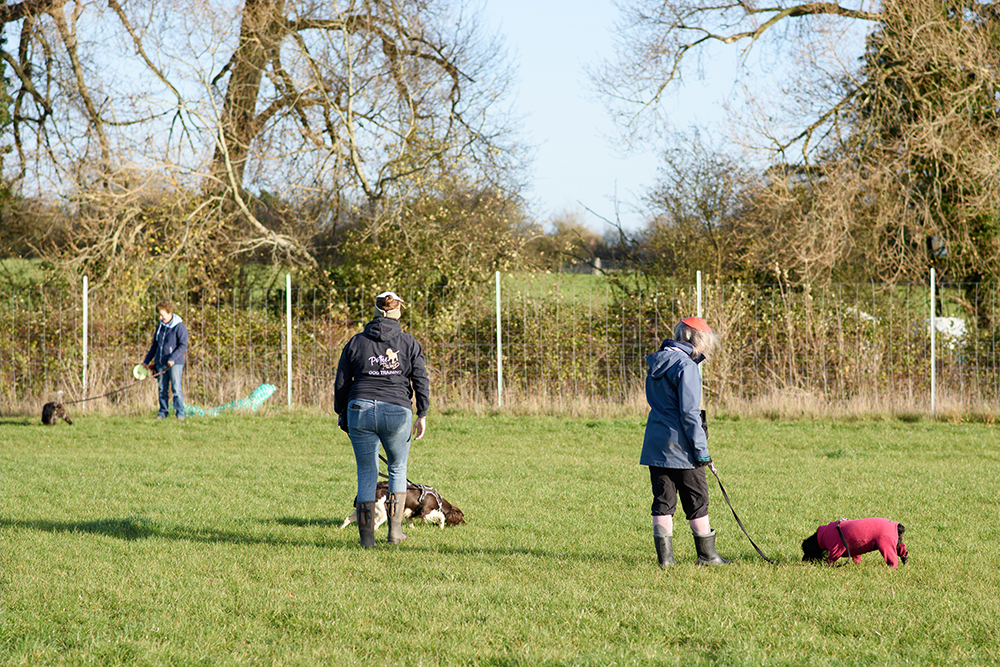
If you've ever attended a dog training class you'll know that you learn lots of activities but sometimes it's easy to question the significance of training in a non-real life environment. Many dog owners express concerns about the effectiveness of training in a 'not real-life' environment, however, there are many reasons as to why practicing in a simulated environment is actually crucial for your dog's development and your own growth as a dynamic dog owner.
Creating a Controlled Environment
When attending training classes or practicing in your garden, it may not seem like a real-life environment for you or your dog, however, these settings play a vital role in your training journey. A controlled environment ensures you and your dog are in place where learning can happen and training is guaranteed (as much as possible) to be successful. By starting in easy situations and gradually progressing to more distractiing and real-life scenarios we enhance the realism of the learning experience but ensuring our dog succeeds.
Think back to when you first learned to swim. Did you immediately dive into the deep end, hoping you could stay afloat? Most likely, you started in shallow water, gradually building your skills and learning how to swim, building your confidence before tackling more challenging or deeper waters. A controlled training environment is similar to those shallow waters. It allows dogs to learn, relax, trust, and develop their skills. Eventually, they are better equipped to handle real-life situations without sinking.
Think back to when you first learned to swim. Did you immediately dive into the deep end, hoping you could stay afloat? Most likely, you started in shallow water, gradually building your skills and learning how to swim, building your confidence before tackling more challenging or deeper waters. A controlled training environment is similar to those shallow waters. It allows dogs to learn, relax, trust, and develop their skills. Eventually, they are better equipped to handle real-life situations without sinking.
Predictability and Support
One of the major benefits of a controlled environment is that everyone involved knows what to expect. This predictability makes both your life and your dog's life easier. In a group class, where all participants share the same goal, everyone understands the desired behaviors. Whether it's teaching your dog to ignore distractions or focus on you, having a group of people working toward the same objective increases the chances of success. A huge benefit of a group class setting is that a supportive community is created. When a dog is struggling, there are cheerleaders and supporters ready to lend a helping hand.
Educating Dog Owners
By practicing in controlled environments, dog owners gain valuable knowledge and essential skill sets. They learn what constitutes polite behaviour and what to expect in an ideal situation. Understanding these foundations helps identify when a situation deviates from the norm or becomes potentially problematic. Equipped with this awareness, dog owners can intervene if appropriate and ensure a healthy and positive interaction for all involved.
Becoming a Dynamic Dog Owner
Training in a controlled environment not only benefits dogs but also empowers dog owners to become more dynamic and responsive. It equips owners with the skills needed to navigate real-life situations, offering strategies to intervene, facilitate healthy interactions, and maintain control when needed. As you grow and learn in this process, you become a dynamic dog owner, providing a loving and supportive environment for your canine companion.
Considering Others and Building Community
It's essential to recognise that responsible dog ownership extends beyond our individual pets. In a controlled training environment, we learn to be considerate of other people and their dogs. Understanding the impact of our actions on others allows us to create safe spaces for all. By ensuring both us and our dogs are polite and responsive, we contribute to the well-being of the entire dog-owning community.
Training in a controlled or simulated environment is instrumental for the growth and development of both dogs and their owners. These environments provide predictability, support, and the opportunity to learn and practice vital skills. By understanding what constitutes polite behaviour and how to intervene in challenging situations, we become more effective in real-life scenarios. So embrace the controlled environment, and remember, it takes a village to raise a dog – a community built on mutual support and consideration. Happy training!
Training in a controlled or simulated environment is instrumental for the growth and development of both dogs and their owners. These environments provide predictability, support, and the opportunity to learn and practice vital skills. By understanding what constitutes polite behaviour and how to intervene in challenging situations, we become more effective in real-life scenarios. So embrace the controlled environment, and remember, it takes a village to raise a dog – a community built on mutual support and consideration. Happy training!
Explore this topic further in our podcast The Dynamic Dog Owner